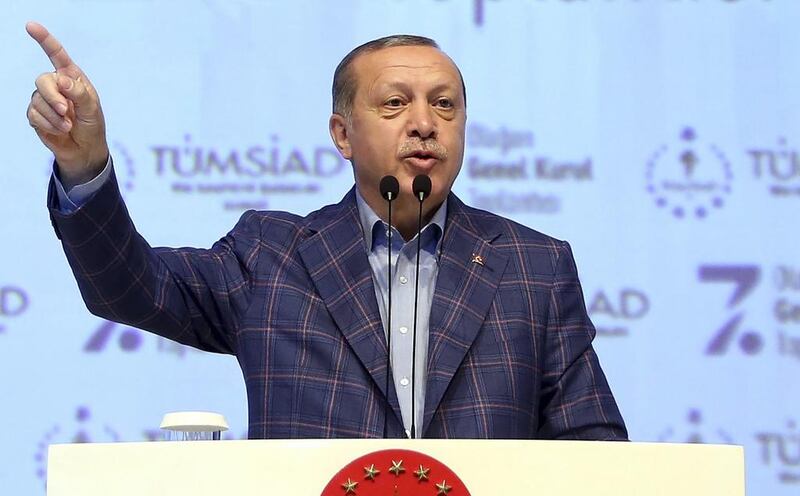ISTANBUL // Turkey and the United States can join forces to turn ISIL-held Raqqa into a “graveyard” for the extremists, the Turkish president said yesterday.
The Turkish government is pressuring Washington to stop backing Kurdish fighters as an ally in the fight against ISIL militants in Syria, in a dispute that has limited cooperation between the Nato allies.
“The huge America, the coalition and Turkey can join hands and turn Raqqa into a graveyard for Daesh,” said president Recep Tayyip Erdogan.
“They will look for a place for themselves to hide.”
His comments came as local media reported that the Turkish military had moved armoured vehicles and personnel carriers to a base near the Syrian border – a day after US troops were seen patrolling the tense border in Syria.
Mr Erdogan is due to meet president Donald Trump on May 16 in the US, the two men’s first face-to-face summit since the American leader took office in January.
Ankara is hopeful about the future of the relationship with Washington under Mr Trump after ties frayed in the final years of the Obama administration.
The two countries have bitterly disagreed over the role of the Kurdish People’s Protection Units (YPG) in Syria.
Turkey sees the YPG as a terrorist group linked to the outlawed Kurdistan Workers’ Party (PKK), which has been waging a deadly insurgency against the Turkish state since 1984.
But for Washington, the YPG is essential in the fight against ISIL militants.
Until nowm the dispute has held up any joint US-Turkish operation to seize Raqqa and Mr Erdogan is clearly hoping for a breakthrough at his meeting with Mr Trump.
Turkey announced earlier this month it had completed its six-month-long Euphrates Shield operation in northern Syria against extremists and Kurdish militia, although it is keeping a presence to maintain security in towns now under the control of pro-Ankara Syrian rebels.
Mr Erdogan said yesterday he would present Mr Trump with “documents” proving the YPG’s links to the PKK, which is designated as a terror group by Ankara and Washington.
“We are telling American friends not to take a terror group along with them,” he added.
Turkey carried out several air strikes in Syria and Iraq against Kurdish separatists and their allies on Wednesday, drawing the wrath of US officials who accused Ankara of poor coordination.
The strikes in the Sinjar area of northern Iraq were against positions held by the Yazidi Protection Units (YBS), a militia supported by the PKK.
“We launched strikes against Sinjar, and the other place (in Syria) and killed 210 to 220 terrorists there. Why? You cannot play with this nation,” Mr Erdogan said.
He hinted at future operations against the YPG and PKK in Iraq and Syria.
“We know very well what to do when the right time comes. We can turn up abruptly one night,” he said, repeating a line from a well-known Turkish song.
Tensions escalated earlier this week with cross-border clashes between Turkish forces and the YPG near the Syrian border. Turkey fired a barrage of artillery at the YPG, who returned fire with rockets on Turkish outposts on the border.
Also yesterday, the Syrian military said its troops and allied fighters had repelled an ISIL attack on a strategic area held by the government in a southeastern area of Aleppo province.
The attack took place in Khanaser – a strategic region that links Aleppo with central and western Syria. Khanaser has changed hands many times during the conflict. But last year, government troops and allied fighters wrested control of the area from ISIL.
The military’s media arm said ISIL had attacked Um Mayyal, a village near a mountain range in Khanaser, and other areas.
The Syrian Observatory for Human Rights, a Britain-based opposition monitor, said ISIL fighters attacked military posts in the area, triggering intense clashes and leaving many casualties.
ISIK’s Aamaq news agency claimed ISIL fighters killed 30 government soldiers in the attack on Um Mayyal.
Elsewhere, hundreds of Syrians from the rebel-held suburbs of eastern Ghouta, near Damascus, protested against infighting between insurgent groups that began on Friday and killed dozens of people.
The infighting came amid an intensified government offensive in the area near Damascus, which the rebels have controlled for years but has been increasingly squeezed by government advances.
“God rid us of all leaders,” the protesters chanted, criticising the head of the insurgent groups for diverting their weapons from the front line with the government.
The infighting is pitting the powerful Army of Islam group against Al Rahman Corps and Al Qaeda-linked group the Levant Liberation Committee, or Hayat Tahrir Al Sham. Each side blames the other for triggering the fighting in the power struggle over control of eastern Ghouta. Some activists have called on Army of Islam to rid eastern Ghouta of the powerful Levant Liberation Committee.
The Observatory said shots were fired at the protesters in one area, injuring five.
* Agence France-Presse, Associated Press





